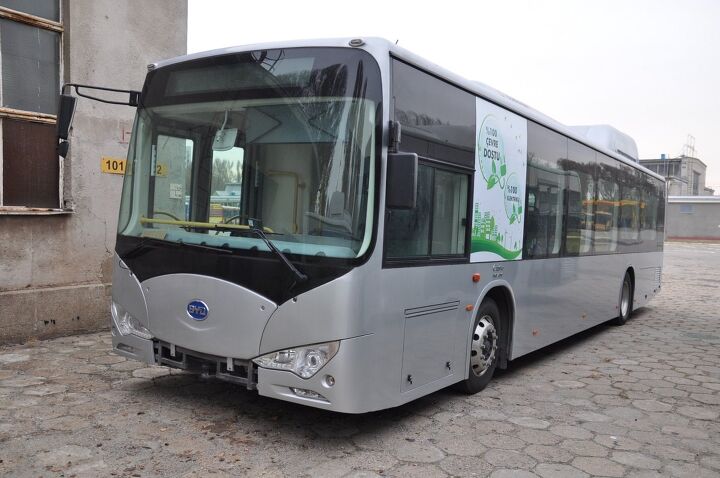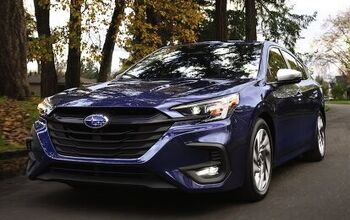Public Transit Electric Avenue Certifiably Not "Awesome"

“I’m probably preaching to the choir here, but EVs are great,” John Beltz Snyder boldly writes in the opening sentence of Autoblog’s “ More research shows why EVs are awesome” article.
For more than 15 years, when not writing about cars, I’ve worked in the public transportation sector. With the exception of the two years I spent as an automotive test engineer, I’ve worked on bus and rail projects in engineering and managerial roles.
Mr. Synder, Autoblog’s resident electric-car guru, states a study published by the Indian Institute of Science shows how much money electric buses save over conventional diesel buses. He continues, in a somewhat non sequitur way, to claim that “switching to an EV is about as big of a difference a single individual can make without giving up driving altogether.”
Needless to say, the Autoblog article, and the study it referenced, is of great interest to me. Unfortunately, it misses the benchmark of the cavalierly claimed awesomeness.
The Indian Institute of Science study can be seen here. It goes something like this: Chinese car and bus company Build Your Dreams (BYD) provided one plug-in electric eBus bus to the Bangalore Metropolitan Transport Corporation (BMTC), for free, for the three-month study. Bangalore is a southern Indian city with a population of about 8.5 million people and an area of 274 square miles, roughly similar to New York City. BMTC has 6,418 vehicles in its fleet and daily ridership of over five million people.
The electric bus ran alongside legacy diesel buses to service a 170 kilometer (105 mile) daily route. The study focused on the cost of running both buses per day and, somewhat oddly, the revenue generated from each bus. Further, it went into the return on initial investment and the amount of CO2 emitted. The conclusion: the electric bus cost less to run, emitted less, was quieter, and wasted less energy when idle. The report states the return-on-investment on the electric bus comes after eight years of service, due to much higher initial cost of the EV bus — 30 million versus 8.5 million Indian Rupees (~$450,000 versus $128,000 USD based on current exchange rates).
There are, however, many issues with this study. First, the study does not mention specifically which diesel bus is used for comparison. The fact that there was only one BYD used is rather irrelevant, as all figures were averaged out. What is relevant is the lack of information on the size of the diesel bus, what engine it used, and the emissions standard to which it adheres. The study does not state year of production, odometer reading, or service history on the legacy bus(es). The study only shows that the legacy bus has more passenger capacity, which actually worked in its favor in the passenger-kilometer-per-day category.
Further, the study does not state the average speed of the buses, a very important factor as the fuel economy of the diesel bus can vary greatly between urban and rural areas. It makes no mention of which BMTC line the test was conducted on, the amount and frequency of stops, nor does it mention dwell time at each stop and each terminal. All of these factors are of great importance to transportation providers all over the world and, once presented, offer a viable vehicle comparison. To put it in car terms, sometimes a Tesla Model S is a better choice than a BMW 535d — and sometimes it’s not.
Most importantly, the study completely ignores several important cost factors. The overhead and capital costs associated with running and maintaining a fleet of electric buses is completely omitted. Also omitted is the recharge time and charging locations. Range is always an issue with electric vehicles and is a much greater issue with buses. Finally, weather was not taken into consideration, but the city Bangalore has never on record had a temperature lower than 40 degrees Fahrenheit. It should be noted that the range of any electric vehicle diminishes as ambient temperatures get lower.
To accommodate an electric bus fleet, significant capital improvements would need to be made to any existing bus facilities. For starters, charging stations would need to be added in garages, along the bus routes, and/or route terminals. The amount of charging stations and their locations would vary greatly by route length, charge time, vehicle quantity, and the maximum range of the electric buses. Likewise, service and maintenance facilities would need to be suited toward electric vehicles with power connections. Personnel working in those facilities would need to be trained to work on electric buses or additional personnel would need to be hired. The cost of these capital improvements would be immensely significant, especially from an ROI point of view, and the study did not address it at all.
The daily life of a major city bus in North America can vary greatly, even if it’s only utilized on the same route its entire life. There are days when city buses are on the road for 18 hours per day with no more than 3 hours of terminal dwell time. Most buses are refueled daily, some twice per day, and the process to fill up a 125-gallon tank takes significantly less time than even the fastest electrical charging, which the study erroneously states to be an hour. Real world fuel economy of a modern 40-foot North American diesel bus ranges between 3.2 and 4.0 miles per gallon, and new hybrid buses get a maximum of about 6 mpg, depending on route type and load. That gives them a typical realistic range of 400 to 750 miles. BYD states that the range of its eBus on a single charge is 250 km, or 155 miles, and it takes five hours to fully charge.
Despite my love of the internal combustion engine, I do appreciate EVs, and I won’t dispute that the concept of an electric bus is a good one. But unlike what Mr. Snyder’s article and the Indian Institute of Science study suggest, the use of electric buses is rather limited for the time being due to upfront costs, charge times, and travel range. There are places that currently utilize electric buses, either on short independent lines or for the purposes of long-term studies. However, in most cases regarding existing intercity bus infrastructure, EV buses are not yet a viable replacement for conventional diesel or hybrid-diesel buses, and are therefore far from awesome.
Disclaimer: Several years ago the author rode in the pictured BYD electric prototype buses in Europe and North America. To say that quality of the early BYD buses was disappointing would be a great understatement. The buses pictured here were ordered by a European transportation company for testing purposes — but never ran as promised.
[Images: © Kamil Kaluski/The Truth About Cars]

More by Kamil Kaluski
Latest Car Reviews
Read moreLatest Product Reviews
Read moreRecent Comments
- Turbo Is Black Magic My wife had one of these back in 06, did a ton of work to it… supercharger, full exhaust, full suspension.. it was a blast to drive even though it was still hilariously slow. Great for drive in nights, open the hatch fold the seats flat and just relax.Also this thing is a great example of how far we have come in crash safety even since just 2005… go look at these old crash tests now and I cringe at what a modern electric tank would do to this thing.
- MaintenanceCosts Whenever the topic of the xB comes up…Me: "The style is fun. The combination of the box shape and the aggressive detailing is very JDM."Wife: "Those are ghetto."Me: "They're smaller than a Corolla outside and have the space of a RAV4 inside."Wife: "Those are ghetto."Me: "They're kind of fun to drive with a stick."Wife: "Those are ghetto."It's one of a few cars (including its fellow box, the Ford Flex) on which we will just never see eye to eye.
- Oberkanone The alternative is a more expensive SUV. Yes, it will be missed.
- Ajla I did like this one.
- Zerofoo No, I won't miss this Chevrolet Malibu. It's a completely forgettable car. Who in their right mind would choose this over a V8 powered charger at the rental counter? Even the V6 charger is a far better drive.





































Comments
Join the conversation
Diesel city buses are a deafening, pollution-spewing plague upon us all. I'm pleased that urea and DPFs have been phased in, and then hybrid technology, but "less awful " still ain't good. I'd love to see electric buses everywhere they're feasible, whether powered by overhead trolley lines, batteries, or whatever. Short battery electric shuttles for low-speed routes work awesome as well; we've had them in my fair city for 20 years.
The electric buses would be a good fir for terminal operations at an airport.